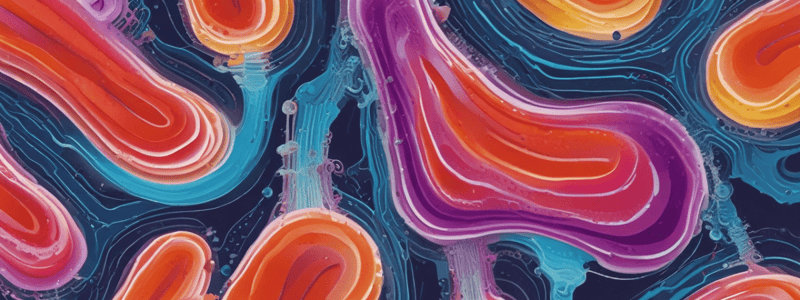Podcast
Questions and Answers
What is the term used to describe a solution that has a higher concentration than plasma?
What is the term used to describe a solution that has a higher concentration than plasma?
- Hypertonic (correct)
- Isotonic
- Hyperosmotic
- Hypotonic
Which of the following is used to treat high potassium levels?
Which of the following is used to treat high potassium levels?
- Dialysis
- Diuretics
- Sodium polystyrene sulfonate (correct)
- Potassium chloride
What is the main effect of diuretics on the kidneys?
What is the main effect of diuretics on the kidneys?
- They block tubular secretion
- They decrease water reabsorption
- They increase urine pH
- They increase sodium and chloride reabsorption (correct)
Which type of diuretic blocks sodium and chloride reabsorption in the loop of Henle?
Which type of diuretic blocks sodium and chloride reabsorption in the loop of Henle?
What is the term used to describe a decrease in urine output?
What is the term used to describe a decrease in urine output?
What is the main difference between thiazide diuretics and loop diuretics?
What is the main difference between thiazide diuretics and loop diuretics?
What is the primary mechanism of action of spironolactone?
What is the primary mechanism of action of spironolactone?
Which of the following is NOT a therapeutic use of spironolactone?
Which of the following is NOT a therapeutic use of spironolactone?
Which adverse effect is associated with spironolactone?
Which adverse effect is associated with spironolactone?
Which drug interaction is a concern with spironolactone?
Which drug interaction is a concern with spironolactone?
What is the primary mechanism of action of mannitol?
What is the primary mechanism of action of mannitol?
Which of the following is a therapeutic use of mannitol?
Which of the following is a therapeutic use of mannitol?
What is the term for a solution with a concentration lower than plasma?
What is the term for a solution with a concentration lower than plasma?
Which diuretic blocks sodium and chloride reabsorption in the distal convoluted tubule?
Which diuretic blocks sodium and chloride reabsorption in the distal convoluted tubule?
What is the major classification of diuretics that is considered less potent and suitable for outpatient use?
What is the major classification of diuretics that is considered less potent and suitable for outpatient use?
Which electrolyte imbalance is managed by avoiding foods and medicines rich in potassium?
Which electrolyte imbalance is managed by avoiding foods and medicines rich in potassium?
What is the primary site of action for diuretics to increase urine excretion?
What is the primary site of action for diuretics to increase urine excretion?
Which term refers to a decrease in urine output?
Which term refers to a decrease in urine output?
What is the main effect of diuretics on sodium and chloride reabsorption in the kidneys?
What is the main effect of diuretics on sodium and chloride reabsorption in the kidneys?
Which diuretic directly inhibits the sodium-potassium exchange in the distal tubules?
Which diuretic directly inhibits the sodium-potassium exchange in the distal tubules?
What is the primary concern with the use of spironolactone?
What is the primary concern with the use of spironolactone?
Which diuretic is an osmotic agent that creates an osmotic force to promote diuresis?
Which diuretic is an osmotic agent that creates an osmotic force to promote diuresis?
Which of the following is a potential drug interaction with spironolactone?
Which of the following is a potential drug interaction with spironolactone?
Which diuretic is contraindicated in patients with renal or hepatic impairment?
Which diuretic is contraindicated in patients with renal or hepatic impairment?
Which diuretic is classified as a potassium-sparing diuretic?
Which diuretic is classified as a potassium-sparing diuretic?
Which diuretic is commonly used to reduce intracranial pressure (ICP) and intraocular pressure (IOP)?
Which diuretic is commonly used to reduce intracranial pressure (ICP) and intraocular pressure (IOP)?
Which of the following is a potential adverse effect of spironolactone?
Which of the following is a potential adverse effect of spironolactone?




